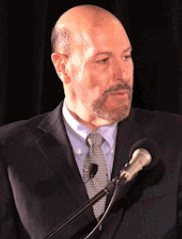|
|
|
|
|
|
|
News & Views item - September 2010 |
![]() Whither (wither?) Our Universities. (September 2, 2010)
Whither (wither?) Our Universities. (September 2, 2010)
 Steven
Schwartz, Macquarie University's Vice-Chancellor entitled his annual lecture
this year "Wise
Up: Restoring Wisdom to Universities", and described the sector's
current state: "We once were about character building but now we are about
money. We live in the age of money, and money is what the modern university is
all about. Apparently we need more circus performers and salon managers. For
some reason, no one seems to worry about a shortage of philosophers, historians
and ethicists ... (but) successful careers depend on the practical application
of wisdom... I don't want to teach students what to think. I want to teach them
how to think."
Steven
Schwartz, Macquarie University's Vice-Chancellor entitled his annual lecture
this year "Wise
Up: Restoring Wisdom to Universities", and described the sector's
current state: "We once were about character building but now we are about
money. We live in the age of money, and money is what the modern university is
all about. Apparently we need more circus performers and salon managers. For
some reason, no one seems to worry about a shortage of philosophers, historians
and ethicists ... (but) successful careers depend on the practical application
of wisdom... I don't want to teach students what to think. I want to teach them
how to think."
It is Professor Schwartz' intention to personally teach a final year course in "Practical Wisdom", and alluding to the causes of the global financial crisis he said: "Highly educated people were corrupted insidiously and by degrees."
In seeking comment on Professor Schwartz' intention to assume the role of lecturer The Australian's Julie Hare was told by Sharon Bell, professorial fellow with the L. H. Martin Institute for Higher Education Leadership and Management at the University of Melbourne, that she questioned the feasibility of a vice-chancellor spending time teaching undergraduate courses: "The leader as role model is important but is it an appropriate role for a vice-chancellor or even possible when his commitments require him to be off campus so much?" Professor Bell asked. "Is it the best use of his time? If you factor in the cost of his wage, it's an unsustainable proposition."
We might counter that in preparing and teaching such a course it might well assist Professor Schwartz in executing his role as vice-chancellor.
Professor Schwartz' address gained the attention of The Times' Simon Baker who noted that Professor Schwartz's lecture last week followed a recent paper on Australian higher education policy by Brad Long, a lecturer at James Cook University's Brisbane campus, in the Journal of Further and Higher Education.
In the the abstract of his paper Dr Long states: "Over the last 35 years Australian higher education policy, like that of most countries, has undergone radical changes. This article reviews these changes in terms of four key periods, beginning with the abolition of student fees, through to the recent unprecedented levels of government control and intervention. Policies are compared with each other and common themes across periods, attempts at reinvigorating or reintroducing old ideas, and genuinely new policies are discovered. Finally, the impact of these policies over the last 35 years on the higher education sector, particularly its academics and institutions, is discussed."
The title of Dr Long's paper, "Losing sight of Humboldt: a synoptic review of Australian government policy over the last 35 years" is in reference to a call for a return to the principles of Wilhelm von Humboldt for universities to be based on "unity of research and teaching; freedom of teaching; and ... self-governance".
And Mr Baker points out that: "Dr Long says that increased student-to-staff ratios and a rise in casual teaching posts point to a decline in quality. 'The corporatisation of universities, culminating in the dehumanising of the academic ... is well under way. Like an obsessive economist, the government continues to tweak the "system" of higher education in an effort to get a higher return on its investment ... universities have been pressed into a corporate environment that requires them to keep their customers happy for short-term viability.'"